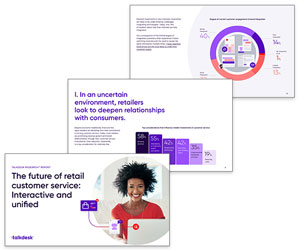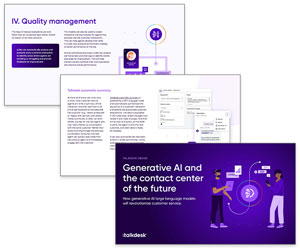Remember what contact centres looked like in 2018? The most successful centres relied on well-trained, empathetic agents who could resolve issues quickly and effectively, all with the help of comprehensive scripts and standardized procedures.
AI and automation were making their way into some processes and customer interactions, but they just weren’t hitting the mark. It feels like we’ve come a long way in 6 short years!
But what will contact centres look like in 2030, just 6 years from now? Will they be incrementally better than today? Will an exponential pace of technological change drive massive improvements? Or will the robots have completely taken over the whole thing?
In this article, Matt Lyles – Keynote Speaker, Brand Consultant, Podcast Host, and DeLorean Enthusiast – travels into the future to see what the perfect contact centre could look like in 2030.
What Will Technology Look Like in a 2030 Contact Centre?
Okay. Time circuits on. Flux capacitor, uh, fluxing. Engine running. All right – let’s go!
Digital Charisma Filters Will Give Agents Prompts to Help Them Be More Effective
The contact centre of 2030 will introduce emerging technologies into the support experience like augmented reality (AR), virtual reality (VR), and digital charisma filters.
AR and VR can both provide immersive support experiences where customers will visualize solutions in real time.
Meanwhile, digital charisma filters will provide agents with prompts before, during and after digital interactions to help them be more effective.
Machine Customers Will Communicate With Brands on Behalf of Their Human Owners
Customers will be using technology to automate support tasks from their side.
While contact centres will be using technology to help agents automate routine tasks, customers will be using similar technology to automate support tasks from their side too.
Enter machine customers – devices or apps that communicate with brands on behalf of their human owners. By 2030 Gartner says that CEOs believe up to 20% of their companies’ revenue will come from machine customers.
Customers’ and contact centres’ machines will be able to communicate and interact with each other while everyone just sits back and, uh, well – focuses on higher-priority tasks.
Want to find out more about machine customers? Read our article: An Introduction to… Machine Customers
Agents Will Be Able to Easily Tailor Interactions to Each Customer
In 2030, customers will expect not just fast service, but personalized service.
With AI-driven customer insights and data analytics, agents will be able to easily tailor interactions to each customer’s preferences and history.
But that personalization will come at a cost to the customer and a greater responsibility to the brand. The more personal information a customer hands over, the more concerned they’ll be about their privacy.
Customers will need to trust that their data is being used responsibly. So, contact centres will need to apply stringent security measures to ensure sensitive information remains protected.
Personality profiles can help contact centres personalize the service they offer. To find out more, read our article: Using Personality Profiles to Personalize Customer Interactions
AI Will Be a Foundation of the Contact Centre
And (of course) AI will be a foundation of the contact centre. It’ll drive everything from predictive analytics to natural language processing (NLP) to automated tasks.
Predictive analytics will be able to allow agents to anticipate customer needs and proactively address issues before they even happen.
AI will drive everything from predictive analytics to natural language processing (NLP) to automated tasks.
Imagine being able to let a customer know of the potential for a delayed shipment and then routing the product from a different location to meet the delivery deadline?
Or how about sifting through thousands of reviews and comments to know which of your retail locations need some extra attention? Thanks, predictive analytics!
NLP will enable more natural, human-like interactions between customers and AI-driven chatbots.
By automating routine tasks and enquiries, AI will reduce a significant amount of workload. And it’ll help agents make more informed, and confident, decisions.
AI will also be able to more seamlessly connect the contact centre to the other functional areas to allow for faster collaboration.
How Will Processes Operate in a 2030 Contact Centre?
The continuing evolution of processes will free up human agents to focus on more complex tasks, we’ll get comfortable with the term optichannel, and more!
Operational Efficiency Will Mean Predicting Customer Needs Before They Even Reach Out
If there’s one thing the 2030 contact centre will excel at, it’ll be efficiency. AI-driven analytics and automation will be able to help eliminate complexity and streamline operations, from handling routine enquiries to predicting customer needs before they even reach out.
These advancements will free up human agents to focus on more complex tasks, ensuring that every interaction is handled with precision and care.
For advice on how to take a proactive approach to identifying customer needs, read our article: Capture Customer Needs – Just Like This!
Optichannel Integration Will Replace Omnichannel Support
Today, omnichannel support is a standard expectation. But in 2030, optichannel will be the next-level expectation where the customer’s real-time situation dictates the best right channel to use.
This could mean a customer seamlessly transitioning from a chatbot interaction to messaging with a live agent and then to a video call with another live agent – all based on the need at any given moment in the conversation.
And – get this – they’ll be able to do this without having to repeat the same information each time.
How Will Customers’ Expectations Change Over the Years?
That’s not all! Contact centres will also have to deal with a new generation of customers with ever higher expectations….
Customers Will Be Able to Leave and Switch to a Competitor Almost Instantaneously
By 2030, customers will expect instant, personalized, and high-quality service – anything less will be unacceptable.
And as technology advances, it’ll make it easier for customers to leave and switch to a competitor almost instantaneously.
For the best ways to create and preserve a long-standing customer base, read our article: 7 Key Ideas for Winning Customer Loyalty
Chat, Social Media, and Video Calls Will Be the Standard
While traditional phone support may still have its place, digital channels like chat, social media, and video calls will be the standard.
At the same time, the communication channels customers prefer will continue to evolve.
As more communication channels become available and widely used, customers will expect contact centres to adopt those channels too.
How Will People Behave in a 2030 Contact Centre?
Wait! If all those changes are going to happen by 2030, how will our agents and leaders be able to keep up? It turns out they’ll need to make some changes too…
Agents Will Need to Level Up to a Whole New Set of Skills – Including Digital Literacy
Call scripts? Basic troubleshooting? Comprehensive SOPs? Those days will be long gone. As call centres use AI to focus on the more routine tasks, agents will focus on the more complex and nuanced problems.
With that, they’ll need to level up to a whole new set of skills.
First among those are strong problem-solving abilities and the capacity to think critically in real time while under pressure.
If AI is going to be an agent’s new co-worker, they’ll need to know how to collaborate with it. Digital literacy will be crucial.
If AI is going to be an agent’s new co-worker, they’ll need to know how to collaborate with it. Digital literacy will be crucial.
That doesn’t necessarily mean mastering AI, but they’ll need to know more than just the basics. This includes understanding how to work alongside AI tools, interpreting AI-generated insights, and knowing when to escalate issues beyond AI capabilities.
These complex and nuanced issues will more than likely be emotionally charged interactions. So emotional intelligence will become a key differentiator.
Mastery of empathy, active listening, and reading customer emotions can be the superpowers that help agents truly stand out.
For advice on essential soft skills that every call centre agent should have, read our article: 5 Soft Skills Every Agent Needs Before Taking Their First Call
Managers Will Need to Shift Away From a Command-and-Control Style
As agents shift their skills and approach to their roles, their management will need to do the same.
Leadership will need to shift from a command-and-control style to one that emphasizes servant leadership, emotional intelligence, and a focus on agent development and continuous improvement.
Since agents will likely not be relying on detailed SOPs and scripts to help customers, managers will need to create environments where their teams feel trusted and empowered to make what they feel is the best decision.
This will be even more crucial as hybrid and remote centres become more dispersed and the traditional physical centre fades away.
If you are looking for advice on skills that every good contact centre manager needs, read our article: 10 Essential Skills for Every Contact Centre Manager
Which Elements Will Stand the Test of Time?
Here’s the thing about predicting the future for contact centres. I really have no certainty as to exactly when or how all these things will come into place.
But here’s where I am certain. Some aspects in the customer experience will not change at all!
The Need for Genuine Human Empathy and Understanding Will Remain Constant
Despite all the technological advances, one thing will remain constant: the need for genuine human empathy and understanding.
As customers experience more and more digital interactions, they’ll be on the lookout for those opportunities to interact with a live human (at least where it makes sense).
If you want to know more about the steps you need to take to better understand every customer, read our article: 3 Steps to Better Understanding Your Customers
Prioritizing Customer Needs Will Be at the Heart of Every Successful Contact Centre
At the heart of every successful contact centre is a commitment to prioritizing customer needs. This philosophy will remain unchanged and should guide everything from how agents are trained to how processes are designed.
So as contact centres implement new technologies, the best ones will implement them based on what’s best for the customer experience, not just the centre’s experience.
The Way to Stay Ahead Will Still Be to Find Ways to Make Customers’ Lives Simpler
The way to stay ahead is to keep finding ways to make customers’ lives and agents’ work simpler.
The commitment to continuously improving processes, skills, and the customer experience will still be crucial.
As the world continues to evolve and become more complex, the way to stay ahead is to keep finding ways to make customers’ lives and agents’ work simpler.
All right, I think we get the picture. Let’s head back to 2024!
Don’t Feel Overwhelmed!
Now you know what you need to build towards in your contact centre if you want to not only survive but thrive in 2030 and beyond. I get it. It’s a lot. But don’t feel overwhelmed!
You’ll be able to get there with an iterative approach. Invest in what you need as you need it. Test and learn what’s working and focus on that. Make sure you’re bringing your people along with you.

The perfect contact centre of 2030 will be a blend of cutting-edge technology and timeless human qualities.
It will be efficient, seamless, and personalized, but still grounded in empathy and customer-centricity.
Sure, a lot of things will change, but the core principles that have always defined a simple and outstanding customer experience will remain. See you in 2030!
Written by: Matt Lyles, Keynote Speaker, Brand Consultant and Podcast Host at Matt Lyles & Co LLC
For more thoughts on what the future holds, read these articles next:
Author: Matt Lyles
Reviewed by: Megan Jones
Published On: 10th Sep 2024 - Last modified: 11th Sep 2024
Read more about - Customer Service Strategy, Customer Service, Future, Matt Lyles, Top Story








































